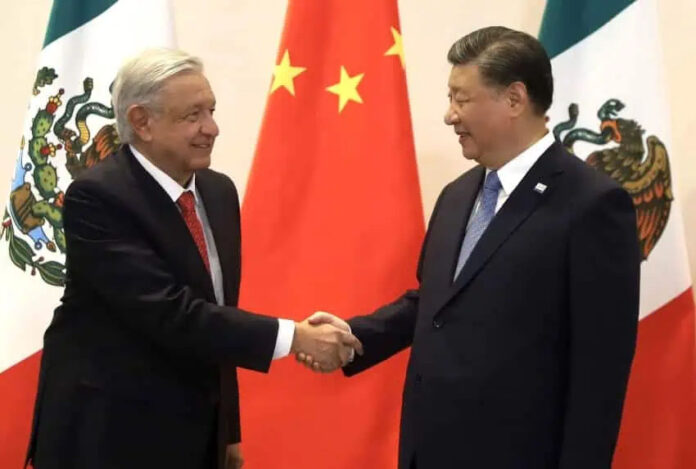by Mexico News Service
The most pressing and important task for incoming Economy Minister Marcelo Ebrard is to impose higher tariffs on Chinese imports to protect Mexican industry, according to Mexico’s longest-serving ambassador to China.
Jorge Guajardo spoke to Mexico News Daily a day after President-elect Claudia Sheinbaum announced her first Cabinet picks, including former Foreign Minister Ebrard as Economy Minister.
We posed five questions to the former ambassador and former consul general in Austin, Texas, focusing on the influx of Chinese goods into Mexico and the related challenges Sheinbaum’s administration will face.
Mexico recently announced new tariffs that will affect more than 500 Chinese products. Does the federal government need to do more to protect Mexican industry?
Guajardo told MND that China has excess capacity in “all industrial sectors” and is consequently trying to offload goods around the world.
While expressing support for current Economy Minister Raquel Buenrostro’s decision to impose tariffs of 5 to 50 percent on 544 products in categories including steel, aluminum, textiles, plastics, chemicals and transportation material, the partner at global consulting firm DGA Group said Ebrard needs to do more to “help Mexican industry withstand this tsunami of Chinese imports.”
The issue needs to be addressed “immediately,” Guajardo said, stating that “if left to drag on for a year,” Chinese imports could “threaten the viability” of a variety of Mexican industries.
He said he is not sure what Ebrard’s stance is on the issue.
“If he thinks we can take advantage of China, I think that would be a monumental mistake that would have a detrimental effect on Mexican industry,” he said.
“The ideal,” Guajardo said, is for Mexico, the United States and Canada to “mirror each other’s tariffs.”
Where appropriate, Mexico should raise its tariffs on Chinese imports to match those of the United States.
Most of Mexico’s current tariffs on Chinese goods are in the 25 to 35 percent range, but China has the ability to absorb them by devaluing its currency and/or reducing production costs, among other measures, he said.
He stressed that Mexico should not be motivated to raise tariffs to appease the United States. Mexico would “ideally” partner with the United States to “stop this import of excess Chinese capacity,” he explained.
Guajardo expressed concern that Ebrard is still thinking about “pleasing or forming alliances” with China when “there is no way to form an alliance with China when it comes to trade.”
Beyond tariffs, what else could the federal government do to protect Mexican industry from Chinese imports?
Guajardo told the MND that the incoming government also needs to be “more creative with regulations” to prevent exports in certain sectors.
Offering an example of the kind of regulations Mexico could use, he cited the European Union’s Carbon Border Adjustment Mechanism, which will impose tariffs on carbon-intensive imports starting in 2026.
He also referred to the Uyghur Forced Labor Prevention Act in the United States, which seeks to stop the import of goods made with forced labor in China.
Looking ahead to the USMCA review in 2026, wouldn’t Mexico be in a stronger negotiating position if it refrained from taking further drastic measures against Chinese imports?
Guajardo ruled out any possibility that Mexico could use its trade relationship with China as a bargaining chip in the upcoming USMCA review.
Any concessions Mexico makes to China on trade would actually “weaken” its position rather than strengthen it, he said. If Ebrard “tries to protect himself or send a signal to the United States that he is also winking at China… I think he will be causing misunderstandings on the part of the United States – our main trading partner – and possible abuses on the part of China,” he said.
The United States Trade Representative, Katherine Tai, recently indicated that the United States could impose tariffs or other protectionist measures on products manufactured in Mexico by Chinese companies. Do you think that will happen?
“Technically, the USMCA is independent of the country of origin of the investments, so if the products comply with the rules of origin, that should be enough [to avoid tariffs],” Guajardo said.
However, the United States could impose measures that stop the importation of certain products manufactured in Mexico by Chinese companies, he said.
Can you comment more broadly on Sheinbaum’s first cabinet picks? Are they business-friendly appointments?
Guajardo stressed that respect for the rule of law is crucial for investment.
On the accomplishments and attributes of the incoming ministers, Guajardo noted that Ebrard, as foreign minister, acted as a liaison with the private sector, including foreign companies, on reopenings during the COVID pandemic.
Guajardo described the incoming foreign minister, Juan Ramón de la Fuente, a former health minister and former permanent representative of Mexico to the UN, as a “seasoned operator” who is “highly respected by almost everyone.”
The appointment of Alicia Bárcena, Mexico’s current foreign minister, as environment minister is “very positive.”
“…We lost a lot of time catching up on our clean energy commitments,” he said, adding that Bárcena, a former ambassador and UN official, is someone who understands the challenges posed by climate change and knows the importance of keeping one’s promises.
By Peter Davies, Mexico News Daily Editor-in-Chief (peter.davies@mexiconewsdaily.com)



